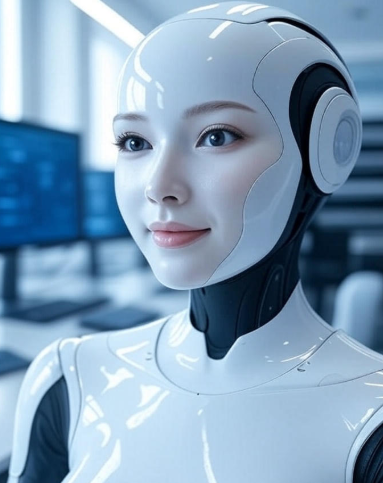In recent years, the beauty and health industries have undergone a transformative shift, fueled by the integration of artificial intelligence (AI). As of April 13, 2025, AI-driven innovations are redefining how we approach skincare, makeup, fitness, and wellness, offering personalized solutions that cater to individual needs with unprecedented precision. From smart mirrors that analyze skin conditions to AI-formulated supplements tailored to genetic profiles, these advancements are blending cutting-edge technology with the timeless pursuit of beauty and well-being. This 1,200-word blog post explores the evolution, benefits, challenges, and future potential of AI-driven beauty and health products, providing a comprehensive look at this exciting frontier.
The Evolution of AI in Beauty and Health
The journey of AI in beauty and health began with basic data analysis and predictive algorithms, but it has rapidly evolved into a sophisticated ecosystem. Early adopters like L’Oréal and Estée Lauder introduced AI-powered tools such as virtual try-on apps, allowing consumers to test makeup shades digitally. These innovations relied on image recognition to match products to skin tones and facial features, marking a significant leap from traditional trial-and-error methods.
Today, the scope has expanded dramatically. Companies like Neutrogena and Olay have developed AI-enhanced devices, such as the Neutrogena Skin360, which uses machine learning to assess skin health and recommend personalized skincare regimens. Similarly, fitness brands like Fitbit and Whoop leverage AI to analyze workout data, sleep patterns, and heart rate variability, offering tailored health advice. The integration of AI with wearable technology and genetic testing has further personalized the experience, with firms like 23andMe partnering with nutrition brands to create supplements based on DNA analysis.
This evolution reflects a broader trend: consumers increasingly demand products that adapt to their unique profiles rather than adhering to one-size-fits-all solutions. AI’s ability to process vast datasets—ranging from biometric data to lifestyle habits—has made this personalization possible, setting a new standard in the industry.
How AI Enhances Beauty and Health Products
AI-driven beauty and health products stand out for their precision and customization. In skincare, AI tools like those from Foreo or HiMirror use facial scanning to detect issues such as acne, wrinkles, or hyperpigmentation, then suggest specific products or treatments. These devices often connect to mobile apps, providing real-time updates and tracking progress over time. For instance, a user might receive a notification to adjust their moisturizer based on seasonal changes or stress levels detected via skin analysis.
In the realm of makeup, AI has revolutionized product selection and application. Brands like Sephora use AI algorithms to recommend foundation shades or lipstick colors based on uploaded selfies, while augmented reality (AR) tools allow virtual try-ons that account for lighting conditions and skin undertones. This reduces waste from mismatched purchases and empowers consumers with confidence in their choices.
Health products have seen similar advancements. AI-powered nutrition platforms, such as Nutrino or DayTwo, analyze dietary preferences, blood sugar responses, and genetic markers to design meal plans or supplement regimens. Wearable devices like the Apple Watch, enhanced with AI, now predict potential health risks—such as atrial fibrillation—prompting early intervention. These tools not only improve outcomes but also educate users about their bodies, fostering a proactive approach to wellness.
Benefits for Consumers and Brands
The benefits of AI-driven products are manifold. For consumers, the primary advantage is personalization. Unlike generic products, AI-tailored solutions address specific concerns, whether it’s reducing fine lines or optimizing vitamin intake, leading to better results. This customization also saves time and money by minimizing trial-and-error purchases. A 2024 survey by McKinsey found that 68% of beauty consumers prefer personalized recommendations, a trend AI is uniquely positioned to meet.
For brands, AI offers a competitive edge. By leveraging data analytics, companies can identify market trends, predict consumer behavior, and optimize supply chains. AI also enhances customer engagement through chatbots and virtual assistants, providing 24/7 support. Moreover, the technology enables rapid product development—AI can simulate how ingredients interact, accelerating the creation of new formulations. This agility is crucial in a fast-evolving market where innovation drives loyalty.
Environmental sustainability is another perk. AI optimizes production by reducing overstock and waste, while personalized products decrease the likelihood of unused purchases. Brands like AmorePacific are using AI to develop eco-friendly packaging and formulations, aligning with growing consumer demand for green practices.
Challenges and Ethical Considerations
Despite its promise, AI-driven beauty and health products face significant challenges. Privacy is a top concern, as these tools often require access to sensitive data—facial images, genetic information, or health metrics. A breach could expose users to identity theft or exploitation. The Federal Trade Commission (FTC) reported a 15% increase in data privacy complaints related to health tech in 2024, underscoring the need for robust security measures.
Accuracy is another hurdle. AI relies on the quality of its training data, and biases in datasets can lead to flawed recommendations. For example, an AI skincare tool trained predominantly on lighter skin tones might struggle with darker complexions, perpetuating inequity. Companies are investing in diverse datasets, but progress is slow, and missteps can damage trust.
Cost is a barrier too. High-end AI devices and personalized services often come with premium price tags, potentially excluding lower-income consumers. While subscription models are emerging to offset this, accessibility remains a work in progress. Additionally, the reliance on technology may alienate users uncomfortable with digital interfaces, particularly older demographics.
Ethical questions also arise. The use of AI to promote unattainable beauty standards—through filtered recommendations or idealized virtual try-ons—could exacerbate body image issues. Regulators are scrutinizing these practices, with the European Union’s AI Act, effective 2025, imposing strict guidelines on transparency and fairness in consumer tech.
The Future of AI in Beauty and Health
Looking ahead, the integration of AI with emerging technologies promises even greater innovation. The convergence of AI and biotechnology could lead to “smart” cosmetics that adapt to skin conditions in real-time, releasing active ingredients as needed. Researchers at MIT are exploring AI-driven nanotech for targeted skincare delivery, a development that could redefine anti-aging treatments.
In health, AI’s role in predictive medicine is expanding. By 2026, experts predict AI will power wearable devices capable of detecting early signs of diseases like diabetes or cancer, integrating seamlessly with telehealth platforms. This could shift healthcare from reactive to preventive, with beauty and wellness brands playing a pivotal role.
Collaboration will be key. Partnerships between tech giants like Google and beauty brands, or health startups and pharmaceutical companies, could accelerate breakthroughs. Open AI platforms might democratize access, allowing smaller firms to compete with industry leaders. Meanwhile, consumer education will be critical to dispel myths and build trust in AI-driven solutions.
Embracing the AI Revolution
As of April 2025, AI-driven beauty and health products are no longer a novelty—they’re a cornerstone of the industry’s future. For consumers, the opportunity to unlock personalized care is empowering, while brands gain tools to innovate and connect. Yet, the journey requires navigating privacy, equity, and accessibility challenges with care.
To stay ahead, consumers should research products, prioritize those with clear data policies, and embrace the learning curve of new tech. Brands, in turn, must invest in ethical AI development and inclusive design. Together, this synergy can harness AI’s potential to enhance beauty and health, creating a future where technology and humanity align seamlessly.
The rise of AI in these fields is a testament to human ingenuity, blending science with self-care. As the technology matures, it will likely become as indispensable as the mirror or medicine cabinet—redefining how we see ourselves and strive for well-being. Whether it’s a smarter skincare routine or a health plan tailored to your DNA, the AI revolution is here, and it’s only getting started.
Sources: McKinsey 2024 Consumer Survey, FTC Data Privacy Report 2024, MIT Technology Review, industry insights from X posts and web searches as of April 13, 2025.



